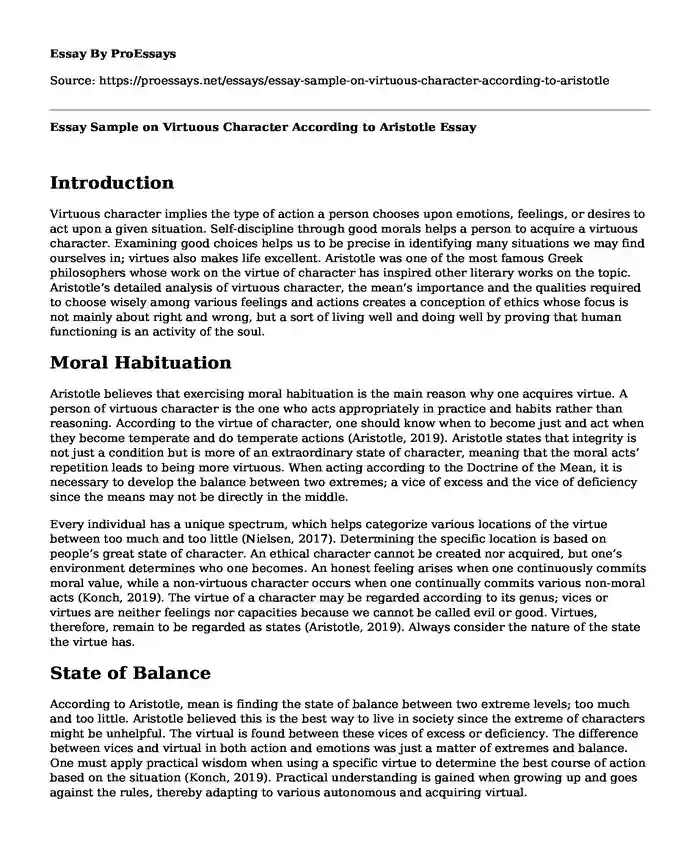Introduction
Virtuous character implies the type of action a person chooses upon emotions, feelings, or desires to act upon a given situation. Self-discipline through good morals helps a person to acquire a virtuous character. Examining good choices helps us to be precise in identifying many situations we may find ourselves in; virtues also makes life excellent. Aristotle was one of the most famous Greek philosophers whose work on the virtue of character has inspired other literary works on the topic. Aristotle’s detailed analysis of virtuous character, the mean’s importance and the qualities required to choose wisely among various feelings and actions creates a conception of ethics whose focus is not mainly about right and wrong, but a sort of living well and doing well by proving that human functioning is an activity of the soul.
Moral Habituation
Aristotle believes that exercising moral habituation is the main reason why one acquires virtue. A person of virtuous character is the one who acts appropriately in practice and habits rather than reasoning. According to the virtue of character, one should know when to become just and act when they become temperate and do temperate actions (Aristotle, 2019). Aristotle states that integrity is not just a condition but is more of an extraordinary state of character, meaning that the moral acts’ repetition leads to being more virtuous. When acting according to the Doctrine of the Mean, it is necessary to develop the balance between two extremes; a vice of excess and the vice of deficiency since the means may not be directly in the middle.
Every individual has a unique spectrum, which helps categorize various locations of the virtue between too much and too little (Nielsen, 2017). Determining the specific location is based on people’s great state of character. An ethical character cannot be created nor acquired, but one’s environment determines who one becomes. An honest feeling arises when one continuously commits moral value, while a non-virtuous character occurs when one continually commits various non-moral acts (Konch, 2019). The virtue of a character may be regarded according to its genus; vices or virtues are neither feelings nor capacities because we cannot be called evil or good. Virtues, therefore, remain to be regarded as states (Aristotle, 2019). Always consider the nature of the state the virtue has.
State of Balance
According to Aristotle, mean is finding the state of balance between two extreme levels; too much and too little. Aristotle believed this is the best way to live in society since the extreme of characters might be unhelpful. The virtual is found between these vices of excess or deficiency. The difference between vices and virtual in both action and emotions was just a matter of extremes and balance. One must apply practical wisdom when using a specific virtue to determine the best course of action based on the situation (Konch, 2019). Practical understanding is gained when growing up and goes against the rules, thereby adapting to various autonomous and acquiring virtual.
A person can have either good or bad traits, but behavior cannot be described as good or evil. Aristotle explains virtually as a disposition that is related to choices. According to Aristotle, personality is one of the three components of the soul: feeling, capacities, and then the character (Nielsen, 2017). Disposition is the only one of the three, which is acquired through learning. Since temperament varies from one person to another, different individuals respond differently to separate in different situations. Disposition is the one that helps a person when making individual decisions or taking action. According to Aristotle, the virtual is a disposition that is augmented through elimination. Behaviors of a person in a particular case are determined by how virtuous one is. According to Aristotle, an action is right when performed based on the person’s virtual, while an act is terrible when performed based on a person’s vice (Rivkin, 2017).
Conclusion
In conclusion, the paper shows how Aristotle’s analysis proves that human functioning and reasoning are the soul’s activity. Means, according to Aristotle, is finding the state of balance between two extreme levels; too little and too much. The means helps one to make a much better decision. Aristotle also argues that character can never be qualified as good or bad, but what defines a person is a behavior and behavior since it can be classified as good or bad.
References
Aristotle. (2019). The nature of virtue. In, Ethical theory: An anthology (pp. 615-629). Wiley-Blackwell.
Konch, M., & Panda, R. K. (2019). Aristotle on habit and moral character formation. International Journal of Ethics Education, 4(1), 31-41.
https://doi.org/10.1007/s40889-018-0061-7
Nielsen, K. M. (2017). Vice in the Nicomachean Ethics. Phronesis, 62(1), 1-25. https://ora.ox.ac.uk/objects/uuid:fc8d26a1-97cb-4c98-a0c4-6b05a95f5621/download_file?safe_filename=nielsen-editing-2-2.pdf&file_format=application%2Fpdf&type_of_work=Journal+article
Rivkin, J., & Ryan, M. (Eds.). (2017). Literary theory: An anthology. John Wiley & Sons.
Cite this page
Essay Sample on Virtuous Character According to Aristotle. (2024, Jan 11). Retrieved from https://proessays.net/essays/essay-sample-on-virtuous-character-according-to-aristotle
If you are the original author of this essay and no longer wish to have it published on the ProEssays website, please click below to request its removal:
- Articles Summary: The Problem with Self-Investigation in a Post-Truth Era and My Problem with George Orwell
- Essay Example on Artist Sam Gilliam's Mental Health Fight: A Case Study
- Warrior Gene: Challenging Our Perception of Violence - Essay Sample
- Essay Sample on English Stress & Intonation: Enhancing Word Understanding
- Essay Example on Ethics: Values, Rules, and Principles for Moral Living
- ABA: Helping Autistic Kids Develop Social Skills - Essay Sample
- Essay Sample on Developing an Ethical Model for the Foster Care System







